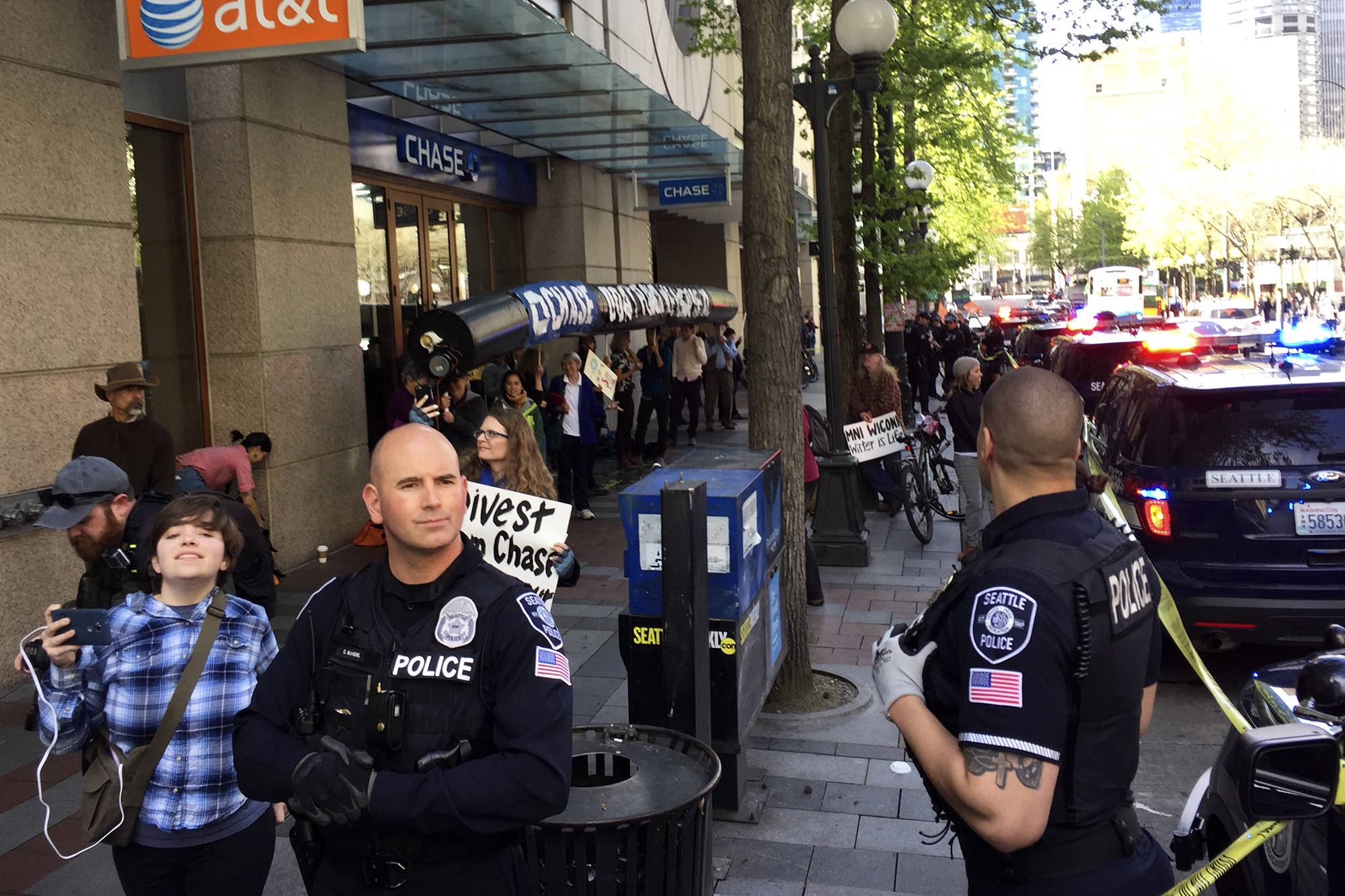As promised, hundreds of Native leaders and climate activists disrupted Chase Bank branches across Seattle on Monday, in an effort to urge the bank not to fund the Keystone XL pipeline. JP Morgan Chase has extended the largest line of credit of any American bank so far to TransCanada, the tar sands oil company behind Keystone XL. In late April, activists—joined by Councilmember Mike O’Brien—demanded that the bank issue a public statement by May 8 promising not to offer the project any loans.
No such statement was made.
And so it happened: Over 200 activists, some clad in white suits splattered in black paint, others with drums and banners and ukuleles, disrupted business at a total of 13 branches from Wedgwood to Fremont to the International District. They did so either by entering the bank and singing and chanting and refusing to leave, or by blocking the bank’s entrance and refusing to leave—or both. Seven branches closed down completely for the day, others were temporarily disrupted. Some activists, such as the Native-led group of water protectors who spent hours singing and drumming inside the branch on 2nd Avenue, left of their own accord to join other scenes at other branches.
By the end of the day, Seattle police arrested at least 26 people and charged them with criminal trespass. Among the first arrested was City Council candidate Jon Grant.
Outside the #ShutDownChase action on 4th Ave pic.twitter.com/oZfffgcWDD
— Sara Bernard (@saralacy) May 8, 2017
“I think it’s just another example of what we can do on the local level,” says Lakota activist Matt Remle, who’s been involved in supporting the Standing Rock Sioux in their fight against the Dakota Access pipeline since the very beginning, over a year ago. He also led activists’ efforts to get the City of Seattle to pull its money from Wells Fargo for its ties to DAPL, as well as resolve not to bank with banks that fund Keystone XL. “A lot of us did go back to the camps [at Standing Rock]… and that was good and needed. But there are also things we can do proactively. That’s what’s important about today. We’re going after Keystone and these other [tar sands] pipelines before the construction comes in, before they started laying down the pipeline.”
The DAPL is now complete, and is slated to begin service as soon as May 14.
All the continued action, then, “makes me feel hopeful,” he says, especially considering the impact that Seattle-based actions seem to be having around the country. Remle says he and other organizers have been working with tribes and cities and individuals on divesting from DAPL, and the amount of money in Wells Fargo accounts closed by cities and tribal governments alone is “closing in on $10 billion.”
Whether or not that $10 billion has any impact, the effort is only growing. Remle and Muckleshoot tribal member Rachel Heaton are teaming up with other Native-led groups, including the Indigenous Environmental Network and Honor the Earth, to launch a new campaign to defund essentially all the major pipelines coming out of the Alberta tar sands. That includes the massive TransMountain pipeline — recently approved by Canadian Prime Minister Justin Trudeau, but long opposed by Salish tribes — which would end near Vancouver, B.C., and dramatically increase oil-tanker traffic through the Salish Sea. Kinder Morgan, the company behind TransMountain, is reportedly arranging $7.4 billion in financing for the project right now.
Remle says what he and others would ultimately like to see, though, is a public bank. “Honestly, none of these banks are that good, for a lot of reasons,” he says, listing private prisons and predatory lending as two examples. “If we could get a public bank, then we’d get out of Wall Street, totally.” He says he’s working with a group of activists from Seattle, San Francisco, Los Angeles, and Oakland, on that effort.
In the meantime, as far as Remle knows, the only action quite like this one — this scattering of activists across a city to disrupt multiple bank branches — is in Seattle.
“We told Chase two weeks ago that we would disrupt business and shut down branches all across the city,” says activist Ahmed Gaya, “and today we delivered on that promise. We ask other cities around the country to replicate this action against Chase and any banks financing tar sands projects until this industry is shut down.”








